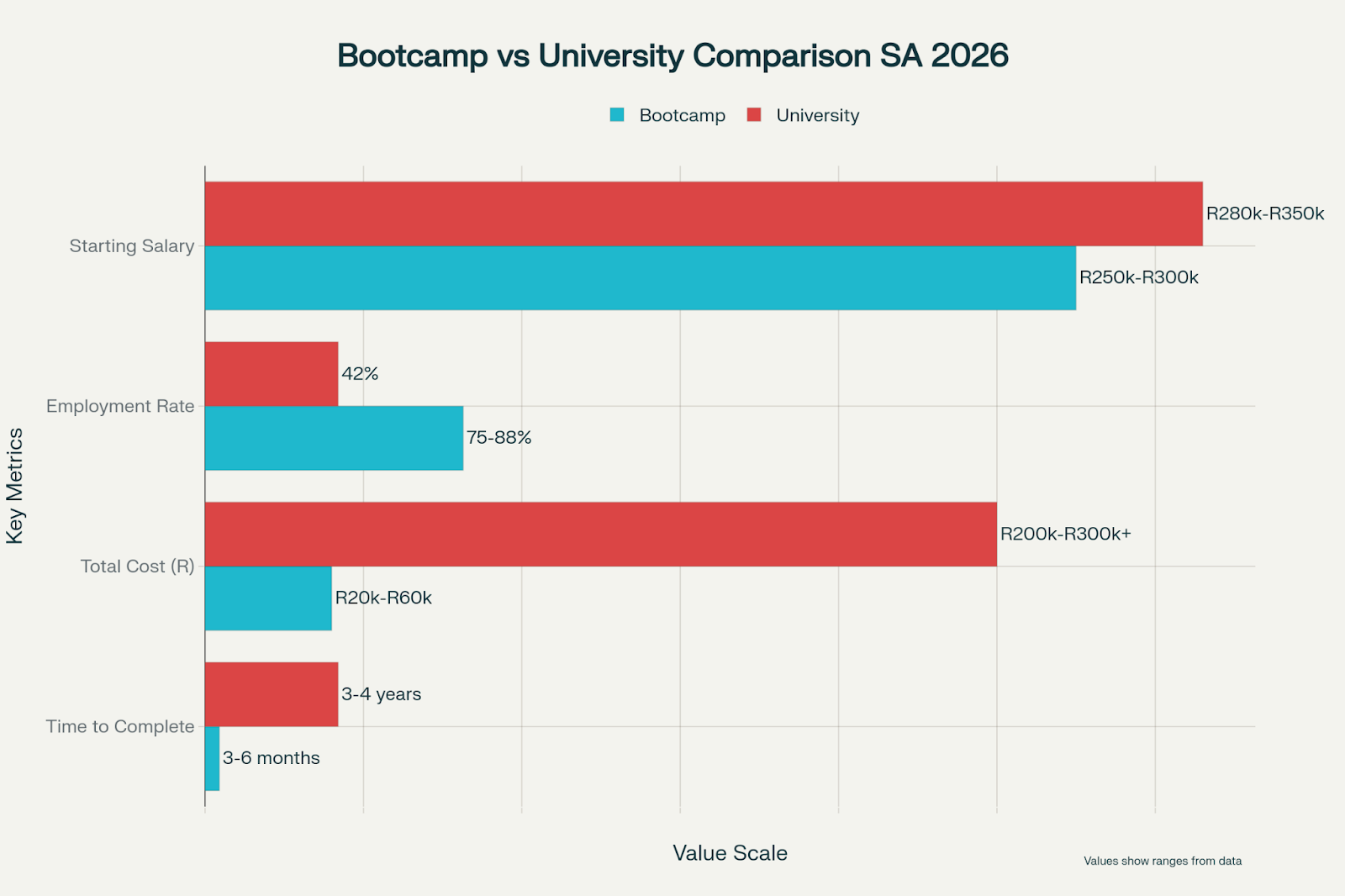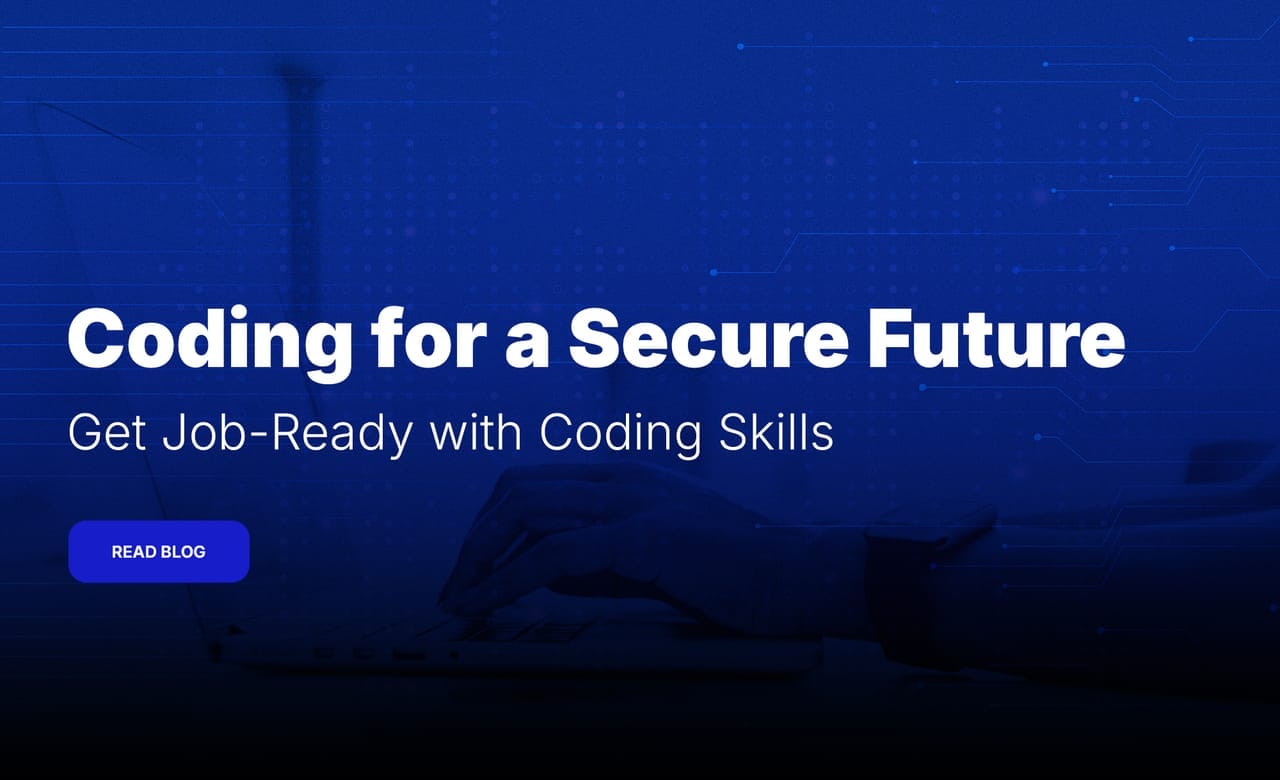
South Africa's technology sector has grown considerably with over 130 000 new job opportunities created and a strong demand for skilled professionals across various sectors. Coding bootcamps and university degrees are two viable and equally valid avenues for aspiring developers to enter this lucrative domain without much hassle. But which ones to choose? According to new data, the outcomes of different courses vary greatly. Coding bootcamps have 75-88% of their students getting jobs 6 months after graduation while this number is only 42% for University Computer Science graduates. This analysis looks at the realities, costs, and career outcomes of both educational pathways so you can decide which is best to kickstart your 2026 tech career. South Africa’s Current Tech Landscape.
Market Demand and Growth Projections.
The technology sector in South Africa contributes 8% to the national GDP. The IT services market is set to hit $7.84 billion by 2029. This rapid growth is leading to a major skills shortage. There are more than 70,000 high-end digital jobs available in South Africa. Meanwhile, unemployment is at a staggering 33.5%. Amazon, Absa, First National Bank and emerging tech companies like Torho Technologies are looking for candidates across provinces.
Current salary ranges reflect this high demand. Full-stack developers take home R60,000 to R105,000 a month while data scientists R30,000 to R100,000. A cloud solutions architect can earn up to R125 000 a month. Meanwhile, a cybersecurity analyst starts out at R50 000 for juniors and R95 000 for seniors. These numbers are significantly bigger than most people’s salaries or incomes.
Skills Gap and Industry Evolution.
Due to quick technological changes, education no longer tatest pretty much any field within the industry. Fifty percent of IT graduates are considered fully prepared for employment says companies. This shortage of tech skills impacts 65% of businesses in South Africa. More than half (51.9%) of developers adopted Artificial Intelligence (AI) tools over the past year, up from 33% a year back.
Education choices are fundamentally affected by this skills mismatch The universities are focused on practical knowledge so employers are looking for certificates that prove skills. The industry’s emphasis on continuous learning and adaptation has raised the stakes for adaptive, skills-based training methods.
University Route: Computer Science Degree.
Structure and Duration.
Computer Science University Programs in South Africa take 3 to 4 years and focus on theory and practice. The University of Cape Town, Stellenbosch University and the University of the Witwatersrand are some institutions where you can pursue accredited degrees which are at NQF Level 7. The courses have an extensive curriculum covering programming languages, software engineering, cybersecurity, artificial intelligence and machine learning teaches the program.
This requirement ensures that graduates will be exposed to subjects other than technical subjects. Students complete 120+ credits over the years. The students get a chance to specialize in the later years. Components of research and capstone project help in understanding a particular academic area well.
Costs and Financial Commitment.
Studying in the university is a big expense. Tuition fees for studying Computer Science at South African universities will be around R66,000, as per year 2025. To complete Computer Science degrees will cost about R200,000-R300,000+ at top universities in South Africa. The inclusion of residence fees will start from R52,000 per year onwards. Stellenbosch University BSc programs cost about R57 130 for first-year students and R78 200 for engineering programs.
Textbooks, tech requirements, lab fees, and living expenses are additional costs.
Financial aid and student loans are required by many students who incur debt loads that affect their financial planning after graduating. A 3-4 year window without full-time employment incurs high opportunity costs.
Employment Outcomes and Career Prospects.
A mix result shows the employment rate of university graduates. According to Studies, 42% of graduates sought after by the ICT sector get a job within six months. 35% get a job within nine months while 23% get a job within twelve months. However, employers state that many graduates do not have the necessary practical experience and job-ready skills requiring further training periods.
Most university graduates will get entry-level positions with a starting salary of R280,000 - R350,00 a year. Over the years, voila! You can earn significantly more. With a strong theoretical background, you can easily advance your career to a higher level. Students can also travel abroad for research with their graduate degree.
Advantages of University Education.
A university program offers a sound theoretical understanding of processes, enabling a graduate to learn new technologies and processes. The academic setting helps you to think critically, research thoroughly, and solve problems, which is good for your long term career. Professional connections and mentorship offered by alumni networks of established institutions.
Some employers and career paths still require accredited degrees. These include jobs in large companies, government roles, or academic fields. University education also helps get admission into master's programs and research jobs.
Bootcamp Path: Accelerated Skills Training.
Structure and Intensive Learning.
In South Africa, coding bootcamps are intensive programs that offer skills training that lasts 3-6 months for most specializations. Leading providers include HyperionDev, WeThinkCode_, Zaio, CodeSpace, and Umuzi Academy, which offer programs in full-stack development, data science, and cybersecurity that are most in-demand.
The programs focus on hands-on learning with practical projects. Students do coding related tasks, collaborative project making and industry exercises daily. In the accelerated format, much more of your time will be consumed. The full-time programs expect you to invest 40+ hours weekly. The part-time programs are designed for people who are already employed.
Curriculums are constantly adapted by bootcamps to meet the demands of the industry. Today's programs have AI tools and cloud computing platforms employers want. They also have emerging frameworks. The program’s emphasis on practical skills enables the graduates to start working right away.
Costs and Accessibility.
Most Bootcamp Courses’ fees range from R20,000-R60,000 making huge savings for University Education. Zaio and HyperionDev bootcamps cost quite a bit, with the former costing around R30,000 for a 6-7 month program. A lot of institutions are providing innovative financing options like income-share agreements, installment payments and corporate sponsorships.
Some notable programs operate tuition-free models. WeThinkCode_ picks candidates through a free 16-month training programme, while Umuzi Academy offers stipend-based training to selected candidates. These choices enable underprivileged communities and low-income students to access tech education.
Shorter duration reduces costs of not studying, allowing students to start earning salaries sooner (in months, not years). A large number of bootcamp students continue working part-time during the training, relieving them of significant financial burden.
Employment Outcomes and Industry Placement.
Bootcamp jobs stats are way better than university ones. Data from the industry indicates that 75 to 88 percent of bootcamp graduates get jobs within six months, many within two to three months. In the first two months of 2025, Zaio placed 131 students in 9 provinces of South Africa with an 81% completion rate of 600-800 trainees a year.
People who successfully complete boot camps usually get starting salaries ranging from Rs 250,000 to Rs 300,000. Furthermore, this number could rise much higher in a quick span of time, depending on your personal skill level and performance. You can apply for various positions like junior software developer, data analyst, front-end developer, cybersecurity analyst at big institutions like FNB, Absa and start-ups.
Bootcamp programs provide high levels of attention to help you with your resume, interview preparation, LinkedIn profile, and direct access to hiring organizations. This career guidance process often guarantees job placement or networks with employers who look for graduates.
Practical Skills Focus.
Bootcamp model focuses on technical skills that can be immediately applied. The learners acquire the vital programming languages, frameworks and development tools desired by employers. When you apply for a job, employers value practical experience over theoretical knowledge. Thus, portfolio projects play a vital role in your placement.Industry partnerships ensure curriculum relevance and provide networking opportunities. Many bootcamps maintain relationships with hiring partners, creating direct pathways from education to employment. Guest speakers, mentorship programs, and industry projects provide real-world exposure and professional connections.
Business partnerships keep our courses relevant and help you make connections. Many bootcamps have relationships with hiring partners, bridging the gap between education and employment. Professionals in the field provide real-life exposure with industry events, workshops and seminars.
Comparative Analysis: Key Decision Factors.
Time to Market and Earning Potential.
The time gap between paths can greatly affect careers and lifetime earnings. Bootcamp alumni can start earning a professional wage six to twelve months after they begin training. In comparison, university students take less time to ready themselves for work but require three to four years before they start earning. A person who attends university for 2-3 years is at least 2.5-3.5 years ahead in terms of earning and work experience.
Yet, in the long run, the earning potential might favor university graduates with a wider range of skills, which promotes advancement to senior technical and management levels. Students who graduate from university tend to have higher ceilings on their salaries that grow over the course of a 10-20 year career. But that bootcamp graduate may be able to pursue education in a lower-cost, quicker program to close these gaps.
Learning Style and Personal Preferences.
Learning paths impact effectiveness depending on learners. These students are best suited for bootcamps who can learn and apply quickly. Learners must possess strong self-motivation and ability to learn quickly under pressure.
College programs are for students who want to take their time to explore theory and practice and ability to handle more structure. The academy offers time for deep conceptual understanding and research probing. Use the online text box to simplify/ rewrite the sentences.
Career Flexibility and Specialization.
University education teaches you theories that help in jobs. Graduates can switch jobs between various technology fields easily. They can take up research in advanced levels or hunt for leadership opportunities which need strategic and analytical skills.
Most bootcamp graduates are good at certain technical areas, but they need to get more education to change careers or move to senior positions. But when students opting for practical skills, it often leads to better job performance, and fast skill induction.
Industry Recognition and Employer Preferences.
The views of employers on bootcamp and university graduates differ substantially across company types and roles. A survey revealed that 72% of employers think bootcamp graduates are as prepared as degree holders to perform well. Despite this, 41% of those surveyed still prefer specialists with a computer science degree in some professions and career levels.
Many large companies and government jobs continue to have degree requirements for policy compliance. Startups and tech companies are increasingly focused on skills than degrees. The job market keeps shifting to be more skills-based, helping bootcamp grads.
Making Your Decision: Practical Recommendations.
Choose Bootcamps If You.
- Must join the job market quickly due to lack of money or need a change of career.
- Prefer a practical learning environment where you can apply your skills † immediately.
- Set specific career goals for the tech sector skills, like web development, data science and cyber security which are in demand in the job market.
- Can stick with difficult study plans and fast learning speeds.
- Inexpensive with the least amount of debt.
- You are willing to engage in lifelong learning and upskilling throughout your career.
Choose University If You.
- You need to take financial and time into account.
- Wish to gain extensive theoretical understanding with broad academic exposure.
- I'm not really sure which technology field to specialize in. I want to try more than one field before I make my final decision.
- Focus on advanced research, an academic career or further academic study.
- Value antique certifications and alumni networks.
- Look for job flexibility and leadership growth chances.
- The personal experiences and development that students go through can be beneficial.
Conclusion and Strategic Recommendations.
It depends on your situation whether to attend a bootcamp or university. Consider your goals, budget, and preferences. Bootcamp education is effective for initial jobs and developing practical skills for these jobs, while getting a degree from a university will teach you the theories behind the practice and allow you to grow your career in the future.
Students who want to get a job right after their studies and do not want to spend much on their education can find quality bootcamp programs like zaio have a compelling case. Bootcamp programs have a high placement record and focus on practical skills rather than theoretical knowledge. Through rigorous training, career assistance, and employer partnerships, smooth transitions to professional employment are afforded.
Students with time and money for university programs may benefit from university programs. These may assist them to gain a broader-base knowledge, scholarship, and traditional credentials that might help in some contexts of career. It isn't a permanent decision, as continuing education can enhance skills throughout a person's career.
No matter which pathway you choose, you will need to commit to learning, hands-on skills, and industry change. South Africa’s tech ecosystem is booming and there are great opportunities for self-driven people from all walks of life. Therefore, 2026 is the best time to study for a career change for a tech job or transform their career via any means that suit their situation and aspirations.













